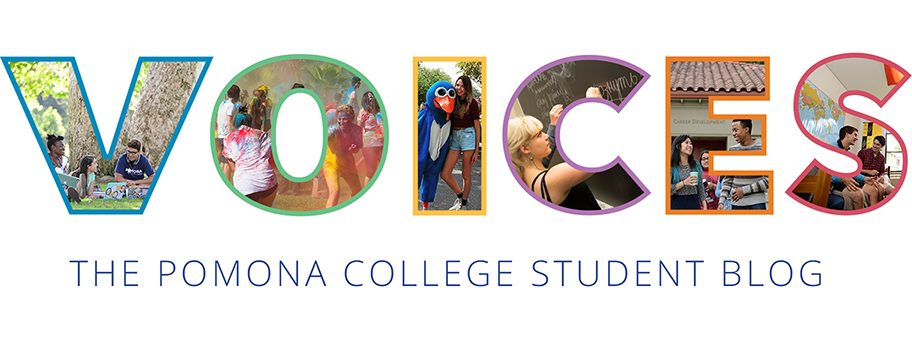By Sophia Sun ’18
As a senior who has strived to fully engage intellectually and socially in the opportunities that Pomona College offers, I’ve realized that the heart of the liberal arts education is not anti pre-professionalism; rather the heart of the liberal arts education involves being self-reflective, throughout the process of learning, about how you can extract transferable skills from any experience and empower yourself to take those skills anywhere. Engaging with a liberal arts education can help one cultivate internal resources of competence, confidence, and creativity. Before I share how I’ve developed these qualities throughout my time at Pomona, I’d like to note that I’m a 1.5-generation Chinese American woman and US citizen, and that these identities greatly shape my perspectives and opportunities. Nevertheless, I hope that you can find something helpful in this article!
COMPETENCE
 “Preparedness” ≠ your major/minor: After putting myself through many different application processes for fellowships and internships, I realized that there are many ways to prepare yourself with the “labels” and “signifiers” that interest employers that go beyond choosing the most practical-sounding major and minor(s). For example, I study Cognitive Science and Computer Science and was interested in supporting a candidate in a local school board election. My major and minor seemed completely irrelevant to this position, but I highlighted my experiences working on academic policies through ASPC (student government). I was able to build on this internship experience to apply to other experiences that are unrelated to my major and minor but relevant to my work experience.
“Preparedness” ≠ your major/minor: After putting myself through many different application processes for fellowships and internships, I realized that there are many ways to prepare yourself with the “labels” and “signifiers” that interest employers that go beyond choosing the most practical-sounding major and minor(s). For example, I study Cognitive Science and Computer Science and was interested in supporting a candidate in a local school board election. My major and minor seemed completely irrelevant to this position, but I highlighted my experiences working on academic policies through ASPC (student government). I was able to build on this internship experience to apply to other experiences that are unrelated to my major and minor but relevant to my work experience.
 Place yourself in situations in which you can learn about opportunities: I subscribe to the Career Development Office’s listserv, various academic department listservs, and various national academic listservs, and I also join Facebook groups pertaining to my professional and personal interests. And I try to read EVERYTHING that I see. This helps me to get a broad sense of what others with my interests are thinking about and doing.
Place yourself in situations in which you can learn about opportunities: I subscribe to the Career Development Office’s listserv, various academic department listservs, and various national academic listservs, and I also join Facebook groups pertaining to my professional and personal interests. And I try to read EVERYTHING that I see. This helps me to get a broad sense of what others with my interests are thinking about and doing.
Preparation is a daily process: Lastly, I’ve found that the best way to prepare for personal statements and interviews is to develop a daily habit of reflecting on your day. If you’re interested in a professional opportunity, look for the personal statement prompt or possible interview questions ASAP and write them in a visible place. Then, as you go about your day, think about whether anything you experienced could be relevant for answering that question.
If you start writing your personal statement and encounter writer’s block, call a friend and record yourself verbally working through your essay. Don’t censor yourself or worry about nailing what you’re eventually going to say–just keep working through ideas until you get a grasp of how you’d like to organize your statement and what anecdotes you’d like to use. Then, transcribe the most useful parts of the conversation. This method has been immensely helpful for me, because I’ve noticed that while I often experience writer’s block, I rarely experience “speaker’s block”!
After every interview, write down the questions that you heard so that you can review them before future interviews.
CONFIDENCE
 Take advantage of the opportunity for close relationships with professors: Throughout my first few semesters at Pomona, I felt that I did poorly in my classes and thus felt very insecure. I rarely talked to my professors because, by the time I needed help, I experienced 2 internally-imposed barriers to asking for it: (1) I was ashamed of my academic performance, and (2) I had trouble overcoming the nervousness I experience when talking to someone for the first time.
Take advantage of the opportunity for close relationships with professors: Throughout my first few semesters at Pomona, I felt that I did poorly in my classes and thus felt very insecure. I rarely talked to my professors because, by the time I needed help, I experienced 2 internally-imposed barriers to asking for it: (1) I was ashamed of my academic performance, and (2) I had trouble overcoming the nervousness I experience when talking to someone for the first time.
Starting second semester sophomore year, I promised myself that I would introduce myself to each of my professors during the first week of the semester. By speaking personally with each professor during a time when I didn’t have much to be afraid of (i.e. doing poorly on one of their exams), I made it easier for myself to approach my professors throughout the semester.
Establishing that relationship did two other important things for me:
1. I gave myself the opportunity to address my academic fears. I realized that I closed so many doors on myself thinking that others would close the door to cool opportunities on me, but talking to my professors helped me better understand how much certain aspects of my qualifications matter or don’t matter. I am so, so grateful that my professors knew me well enough to highlight strengths that I overlooked because I was so fixated on my weaknesses.
![]() 2. I learned that it’s important to make my interests known to people who can help me. One of my favorite parts of being at Pomona is engaging with professors who are so curious about my passions and aspirations. Through articulating my interests and aspirations with professors who are curious, patient, well-connected and invested in my growth, I’ve gained the confidence to share about my passions and aspirations in other settings as well.
2. I learned that it’s important to make my interests known to people who can help me. One of my favorite parts of being at Pomona is engaging with professors who are so curious about my passions and aspirations. Through articulating my interests and aspirations with professors who are curious, patient, well-connected and invested in my growth, I’ve gained the confidence to share about my passions and aspirations in other settings as well.
Building your confidence is just as important as building your resume: As a political canvasser, I encountered and learned to confidently handle a lot of strange situations. Once, I approached the home of a voter only to be greeted by an angry dog who rushed out the door and nearly bit my hand off. Although I did this internship on a whim and it was unrelated to other subsequent pursuits, I cannot think of an experience that has cultivated more courage: the courage to apply for something I was not really qualified before, and the courage to respond to opposition and convince someone to do something they were reluctant to do (i.e. to
vote).
CREATIVITY
The most important skill I cultivated throughout college, is the ability to do things because I love them, not because they’re professionally strategic, and to make them professionally strategic when I need them to be.
Interacting with inspiring peers: Being around such an intellectually and socially diverse community of peers has empowered me to draw creative connections between my different experiences. In my various classes and commitments, I meet peers who are there for many different reasons. Learning about these motivations has helped me to understand the many different ways I can apply what I’ve learned. For example, through working with Christina Tong (CS major ‘17) on Pomona’s academic policies, I’ve learned about and experienced the many parallels between the cross-functional leadership and technical knowledge required to be successful as both the ASPC VP of Academic Affairs and a Product Manager for a big tech company.

Immersing myself in different industries: Interviewing for Management Consulting, Software Engineering, and Product Management internships for my junior summer required me to spin my resume in different ways. Speaking with friends in those industries and asking about how they highlighted various experiences helped me to understand how I could connect my experiences with seemingly unrelated opportunities. The more interviews I did, the better I became at crafting different narratives for different purposes. By the end of a long recruiting season, I gained so much confidence knowing that experiences that I pursued out of pure passion could become professionally strategic even if I did not intend for them to be.
